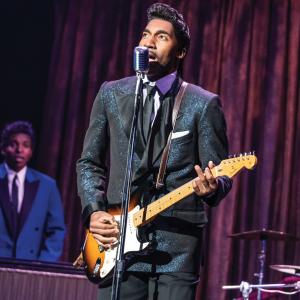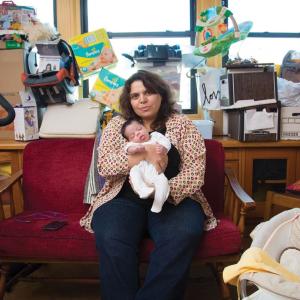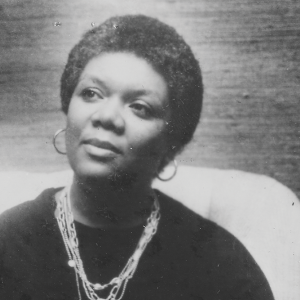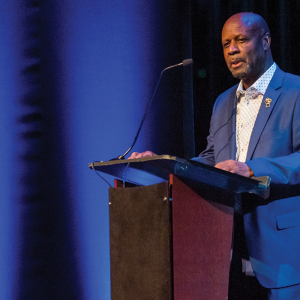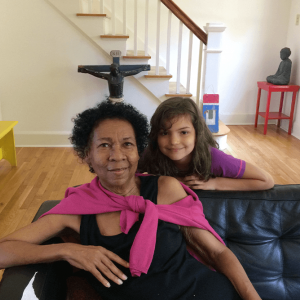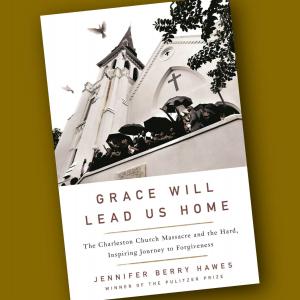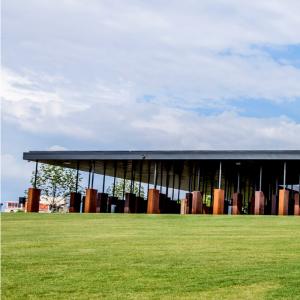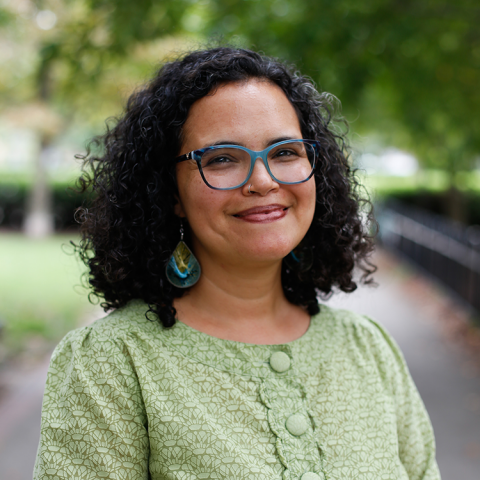
Josina Guess is an editor, writer, mother, farmer, and community organizer based near Athens, Ga. She writes at the intersection of ecology, race, history, and faith. She was born in rural Alabama and educated in Washington, D.C., public schools. While growing up in D.C., she and her family attended New Community Church in the Shaw neighborhood. As a young adult, she was a member of Woodland Presbyterian Church in Philadelphia where she served as director of children, youth, and family ministries and was trained in Godly Play. She is an active member of the Comer Quaker Meeting of Southeastern Yearly Meeting.
Before joining Sojourners staff, Josina was a senior writer and managing editor for The Bitter Southerner. She has written for Atlanta Magazine, Oxford American, Ecotone, Fourth Genre, About Place Journal, Christian Century and the anthologies Bigger Than Bravery: Black Resilience and Reclamation in a Time of Pandemic edited by the late Valerie Boyd (Lookout Books, 2022), Rally: Communal Prayers for Lovers of Jesus and Justice, edited by Britney Winn Lee (Upper Room Books 2020), Wisdom of Communities: Volume 4 – Sustainability in Community: Resources and Stories about Creating Eco-Resilience in Intentional Community edited by Chris Roth (Fellowship for Intentional Community 2018), and Fight Evil With Poetry edited by Chris Campbell and Micah Bournes (Sideshow Media Group 2018).
Along with her husband, Michael, and their four children, Josina lived and worked for six years at Jubilee Partners, a Christian hospitality community in rural Georgia. She is a contributor to the "Refugees in Georgia Oral History Project" for the Russell Library at the University of Georgia and a 2018 recipient of a Louisville Institute PSP Grant. She honed her writing and editing skills at workshops at the Collegeville Institute for Ecumenical Research.
Josina graduated from Earlham College in Richmond, Ind., with a B.A. in art concentrating in ceramics. She earned her MFA in narrative nonfiction from the University of Georgia. She loves cooking, gardening, and walking to the river with her family and dogs.
Posts By This Author
When the Curtain Closes in ‘TINA,’ Life Doesn't Imitate Art
Actor Garrett Turner on drawing a clear line between himself and the broken man he portrays.
BEFORE HE STEPS onstage as Ike Turner in TINA: The Tina Turner Musical, Garrett Turner (no relation) does a simple ritual: He swirls a wooden mallet along the rim of a Tibetan singing bowl. As the sound washes over him, he focuses on himself as Garrett, not Ike the musician and abusive ex-husband of the “Queen of Rock ’n’ Roll.” And he prays.
“Tina found Buddhism on her way to liberation from Ike, and it was something that Ike decried,” Garrett told me a few days after I saw him perform in Atlanta. Embracing something that Ike pushed away helps Garrett become Ike onstage while remaining Garrett within. With eight shows a week for the touring Broadway production, this spiritual practice helps Garrett draw a clear line between himself and the broken man he portrays.
Finding Our Stories in the Stuff We Cling To
When the things of the past crowd out the present, how do we let go and hold on to what matters most?
“WHERE WILL THE Judaica go?” a friend asks Judith Helfand, in reference to the material objects of her faith. Helfand is an Ashkenazi Jewish documentarian who turns the camera on herself and her family to tell larger stories. Here, she’s telling a story of becoming a “new old mother” the year after her own mother dies. She takes a deep breath of her newborn daughter’s hair and turns to her friend, who is trying to help her store and organize the too many things in her New York apartment. “That is such a good question,” replies Helfand, who embraced motherhood by adopting at age 50. “It’s the age-old Jewish question,” she continues. “Once we left the desert we were like, s---, now we have to find places for our stuff!” She breaks into laughter, that special laugh of the sleep-deprived and overwhelmed new parent, and never answers her friend’s question directly.
Love & Stuff, a POV documentary available on PBS, based on Helfand’s shorter New York Times Op-Doc with the same name, is full of age-old questions about holding on and letting go. Love & Stuff doesn’t offer easy answers or quick fixes, instead revealing the struggles and choices we make in curating our living spaces.
Why Poet Lucille Clifton Is My Matron Saint
My research led me to her personal writings; her work has become an oasis.
I was wrapping up some research in the Stuart A. Rose Manuscript, Archives, and Rare Book Library at Emory University when I requested a box of Lucille Clifton’s personal writings. I had not come to study Clifton. I was researching anti-lynching activism in Georgia, specifically a 1936 lynching photograph. But by the end of the week, I began turning to Clifton’s personal writing as an oasis. “Resolve to try to fear less and trust more and be healthy,” she wrote in her red Writer’s Digest Daily Diary on December 31, 1979. Clifton was a published children’s book author, memoirist, activist, and the poet laureate of Maryland when she wrote those words. She was also 43, the same age I was that September day. Her body of work, which includes Two-Headed Woman and Blessing the Boats, crossed oceans, told family stories, and revealed both the sting of injustice and the heart of what’s holy.
The day after Clifton resolved to “fear less and trust more and be healthy,” she wrote in her journal that she returned to a house with “no central heat; bad plumbing; and foreclosure.” A few weeks later, the house was auctioned off to the highest bidder. She sat down and wrote something anyway.
Remembrance as Resistance
The legacy of Denmark Vesey, Mother Emanuel AME Church, and the stories that resist removal.
IN JULY, Lee Bennett Jr. stood at the podium of the Gaillard Center in downtown Charleston, S.C., as part of a three-day bicentenary commemoration of Denmark Vesey — a free Black man who had planned what could have been the largest organized resistance by enslaved people in U.S. history. Bennett brought both American history and personal history with him that day: The space where he spoke used to be his own neighborhood. There are some places where the veil between past and present feels especially thin.
The next day, Bennett offered me a tour of Mother Emanuel AME Church, where he is the historian. He spoke about Vesey, a founding member of Hampstead AME Church, established in 1818. In 1822, Vesey was arrested and executed, along with 34 others, for his plan to liberate the enslaved people of Charleston. Later that same year, a white mob destroyed Hampstead Church. By 1834, the city of Charleston made it illegal for Black congregations to meet, pushing the congregation to gather in secret until after the Civil War. In 1865, they came out of hiding and took the name Emanuel, “God with us.”
The Bible Verse bell hooks Shared With My Kids
When I met bell hooks three years ago, I had all four of my children in tow and I wasn’t sure what to say. A mutual friend arranged a short visit to her home. My heart was bursting with gratitude for all the ways hooks wove race, gender, class, faith, place, and love into her work. My mind was racing with ways to express some fraction of my appreciation and awe.
‘I Do Not Know How to Unclench Rage-Tight Teeth’
When I was in labor with my third child, my older sister was bewildered by my pain. As I walked the hall of our two-story row house in southwest Philadelphia, seeking moments of comfort between birth pool and bed, couch and floor, she said to me, “But, you’ve already done this before. Why is it so hard?”
“I haven’t birthed this baby!” I cried out to her. Then I settled into a deep silence, preparing myself for the next wave, the next earth-shaking moan.
The Damage Done
A review of ‘Grace Will Lead Us Home: The Charleston Church Massacre and the Hard, Inspiring Journey to Forgiveness,’ by Jennifer Berry Hawes
"AND THERE SAT a dark leather-bound Bible soaked in blood. A bullet had pierced its pages.”
The Bible belonged to Felicia Sanders, one of the five people to walk out of Mother Emanuel AME Church alive after a stranger who had been welcomed to a Bible study shot and killed Rev. Clementa Pinckney, Cynthia Hurd, Susie Jackson, Ethel Lance, Rev. DePayne Middleton-Doctor, Tywanza Sanders, Rev. Daniel L. Simmons, Rev. Sharonda Coleman-Singleton, and Myra Thompson.
The quote is from Jennifer Berry Hawes’ new book, Grace Will Lead Us Home: The Charleston Church Massacre and the Hard, Inspiring Journey to Forgiveness. With measured prose and journalistic excellence, this book rounds out the forgiveness and grace that have become synonymous with the Charleston massacre by exposing the outrage, isolation, and bumpy road of grief that followed the deaths.
Why I Brought My Children to the Montgomery Legacy Museum
Dedicated to victims of lynching, the museum and monument create space to mourn those whose killings were covered in silence.
MY THROAT STARTED to feel tight a few days before I went to Montgomery this April. I had been planning this pilgrimage to Alabama with my teen children for months but, as the days grew closer, I questioned my body’s ability to walk into the grief that was awaiting us at the Legacy Museum and National Memorial for Peace and Justice.
As a biracial African-American woman putting down roots in the rural South with my white husband and our four children, daily life can feel like an act of resistance. Every day we are faced with Confederate flags and memorials that celebrate an era and mindset that would have made our marriage and my equal ownership of our property a crime. But we love our home, the land, and our neighbors. We want, in the words of Gwendolyn Brooks, “to conduct [our] blooming in the noise and whip of the whirlwind.”
I was determined to bring my older children to the state of my birth, to take an unflinching look at our racist past and present, and to give them courage to walk the unfinished path toward justice. But still, I found it hard to breathe.
I gardened with a single-minded ferocity in the days before our trip, pulling weeds and digging up long taproots as though I could purge the evils from our land with my bare hands. Red dirt began to lodge deep beneath my nails and in the dry creases of my fingers, my forearms bore slashes from the thorny vines that whipped me as I tore them from the earth. There were flowers, thick with the hopeful scent of spring, trying to bloom beneath the tangle of weeds. I yanked and tore in every spare minute I had, stopping only when I noticed blood pouring from a deep slice on my right forefinger.
It felt right to come with dirty, bloodied hands into those sacred spaces in Montgomery.
